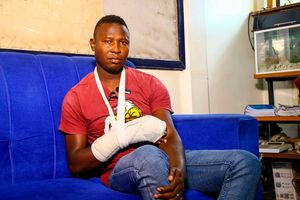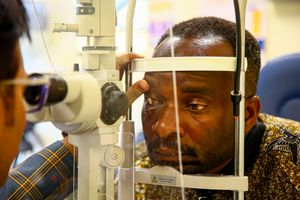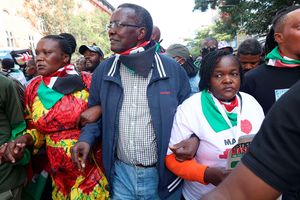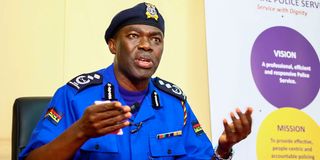
National Police Service Spokesperson Michael Nyaga Muchiri in his office at Jogoo House, Nairobi on July 2, 2025.
In an exclusive one-on-one interview, Police Spokesperson Michael Muchiri Nyaga reflects on the June 25, 2025 youth revolt that rocked 27 counties as Gen Zs commemorated the lives of 60 youths killed by police during the 2024 anti-finance Bill protests.
Mr Muchiri spoke about trauma, accountability and hope for healing.
When the Nation team arrived at his Jogoo House office, the NPS spokesperson immediately grounds the conversation with a personal revelation: before he is a police officer, he is a father to a Gen Z in his twenties.
He shared that since last year, he and his son have had difficult conversations about protests, police brutality and the devastating loss of young lives at the hands of those sworn to protect them.
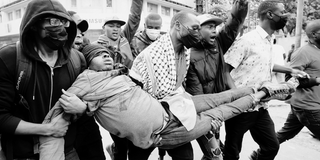
Face mask vendor Boniface Kariuki is rushed to hospital by protesters after he was shot by a police officer in Nairobi on June 17, 2025.
“My son is in college. Whether he joins protests or not is his choice, I do not dictate that. So, I empathise deeply with those who have lost children because I am a parent first and even one life lost is one too many,” he tells the Nation.
“We, as police officers, are also having these conversations among ourselves. We cannot pretend everything is okay and we must first acknowledge the challenges young people are facing.” He adds that within internal NPS communication channels, officers are being urged to recognise that “these are not ordinary times”.
“There are learning curves, and we expect to grow from them — to become better at policing, and more attuned to the realities of young people.”
Mr Muchiri revealed that over 300 officers were injured during this year’s June 25 protests.
“These were not just physical injuries. Many are struggling with emotional trauma,” he explained.
He recounts the now-viral video of a young female officer identified as Emily being stepped on by protesters.
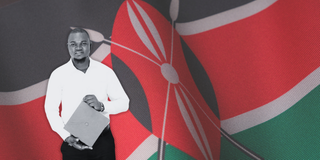
Teacher Albert Ojwang who mysteriously died in a police cell.
“It was a near-death experience. But in that same video, a young man shields her. That moment spoke volumes it said, ‘No, we can’t become monsters ourselves,’” he said in the interview.
Mr Muchiri himself led operations in Kikuyu during the 2024 protests saying the experience was painfully traumatic, adding: “under this blue uniform, many of us carry silent scars.”
To support officers’ mental health, the police chaplaincy department has begun providing counselling.
He refers to teacher-cum-blogger Albert Ojwang, who died in police custody, as a “terrible, tragic case that the NPS has publicly addressed with deep regret”.
Asked about the video of Boniface Kariuki, a mask vendor shot in the head at close range by a police officer on June 17, Muchiri does not hold back.
“At first, I thought the video was fake. But now, we live with the reality and our officers must operate within the Constitution.”
Ahead of potential Saba Saba demonstrations, Mr Muchiri urges caution.
“We must build consensus. It’s not about stopping protests but about how, when and where they happen to avoid hijacking by criminals,” he said.
Asked whether proposed laws regulating protests are draconian, Mr Muchiri responded saying “If protests are peaceful and lawful, we are glad to see them happen. But when bad actors infiltrate, they taint the cause and cause destruction.”

